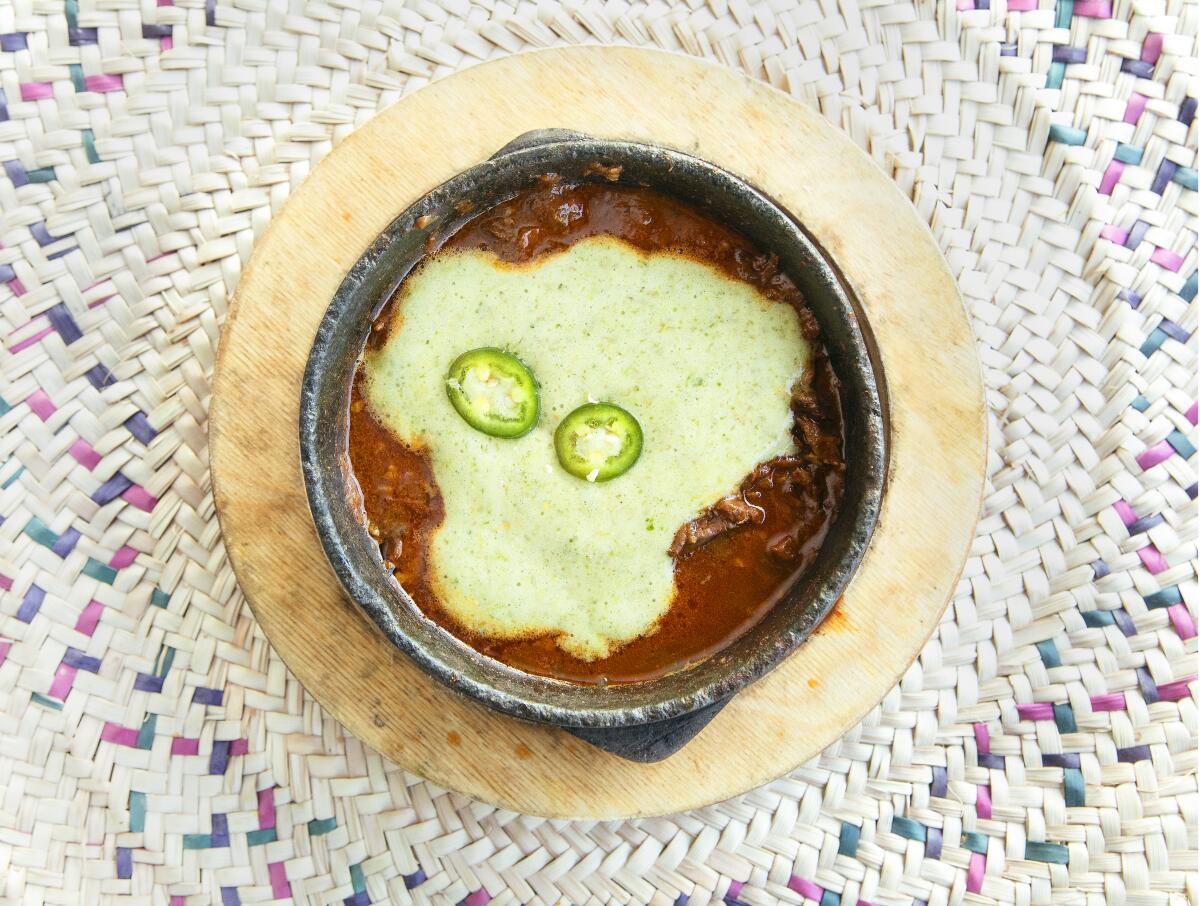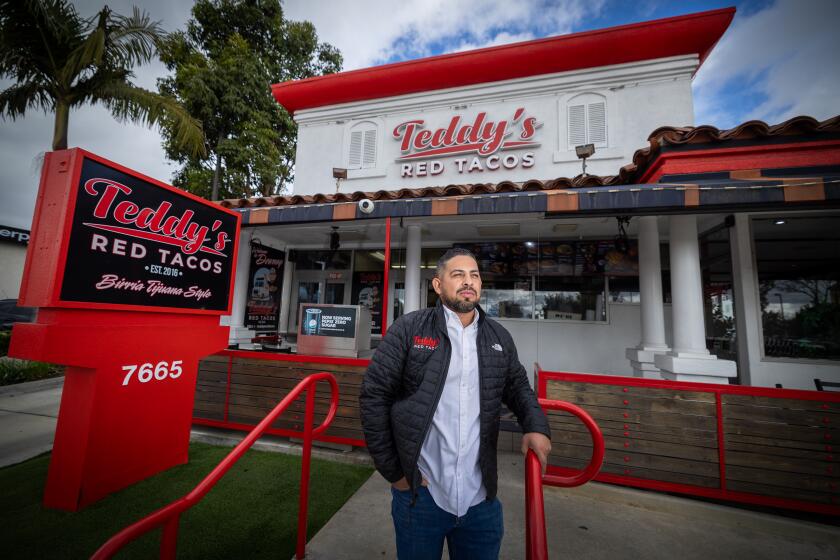House of Mandi brings the flavors of Yemen to Westwood

- Share via
Walking through the glass doors of House of Mandi in Westwood, my eyes went straight to the fabric patterns I remembered from the restaurant’s original location in Anaheim. Ribbons of black-and-white geometrics stream across stop-sign-red cushions. I peered around the far corner of the dining room and, sure enough, there were the similar low-to-the-ground partitioned booths for communal seating, all full of diners on a rainy Wednesday night.
I wrote about the first House of Mandi, run by Sarem Mohamed and his family, back in July 2021.
The restaurant took over the space that had long housed Olive Tree (a heartbreaking casualty of the pandemic) anchoring one end of U-shaped Little Arabia Plaza. In an area most richly saturated with Lebanese, Palestinian and Syrian flavors — the homey goodness of Al Baraka, the manaeesh at Forn Al Hara in dozens of savory variations, newer Kababji Grill for raw and cooked versions of kibbeh — House of Mandi had opened a specific window into Yemeni cooking, shaped for centuries by trade routes that ran through the Arabian Peninsula and along the Red Sea.
Family member Faris Alkabass oversees the second branch, which he launched last March with chefs Om Fayad and Zumzum Omer. The menu looks nearly identical, a gift for those who have a shorter drive to Westwood than to Orange County.

Meals center on the restaurant’s namesake feast, a platter of aromatic rice and meats intended for groups: The “whole lamb of mandi,” for example, costs almost $600 and feeds up to 18 people. At lunch, the restaurant serves portions geared for individuals, with accordingly reasonable prices.
At dinner my table ordered the “No. 1” option, comprising lamb roasted two ways and spice-rubbed roasted chicken, for three people at $93. It was an image of bounty. Turmeric-stained, cardamom-scented grains created a base for the splay of chicken and lamb. Garnishes dotted the landscape: whole green chiles, round lemon slices, wisps of caramelized onions. The odd slivered almond or golden raisin occasionally showed up, having almost disappeared into the rice.
Haneeth, one of the lamb variants, arrived still in its foil to preserve its juiciness. I unrolled the packet onto the tray and the mingled scents of spices rose up from the steam. I caught cinnamon and garlic and ginger and black pepper before they evaporated, but I found them again in the lush meat.
Alongside there were herbed yogurt and what the menu labels “Yemeni sauce” — a.k.a. zahawiq, also called salata harra but more widely known these days as zhoug — its adoptive name in Israel and throughout much of the Middle East. Many versions burn with green chile, but this one is as tame as the mildest tomato salsa.
They helped every forkful vary in taste and texture.
The other crucial order to me is fahsah, a dense, mulchy stew of shredded lamb and vegetables fragrant with cumin and coriander. It arrived in a stone pot simmering around the edges, not quite as volcanically as soondubu appears from the kitchen in Korean restaurants, and crowned with a wholly unique topping: silky, pale-green hilba. It’s made by soaking ground fenugreek for several hours; beating it to a consistency that registers somewhere between meringue and Cool Whip; and then stirring in a puree of scallions and herbs.

This marvel of science fascinated me as much as it did on my first encounter in Anaheim — so much so that I went back to “Sifratna,” an authoritative cookbook on Yemeni food by Amjaad Al Hussain, to study the instructions. Someday the right chef will reignite the trend of modernist, vegetable-forward vegan fine dining in Los Angeles, and I hope they adapt fluffy whipped powdered fenugreek as a nondairy embellishment. (As it happens, House of Mandi does serve a vegetarian version of fahsah slicked with hilba.)
For contrast to these hefty centerpieces: shafoot, a salad of herbed yogurt and cucumbers over thin bread that, as it absorbs the ingredients over top, takes on the delicateness of a large crepe.

There’s a whole section of breakfast dishes on the menu, available any time of day; Al Hussain notes in her book that her family often eats morning staples for dinner too. Lamb galaba featured chopped bits of lamb sauteed with minced peppers, tomatoes and onions, tossed in nicely gritty spices and delivered sizzling in a stone pot. The Yemeni version of shakshouka came in scrambled form, cooked to firm, nubbly curds almost like diner eggs.
They wouldn’t be as bad as an early lunch, alongside strong Arabic coffee brewed with cardamom. The restaurant opens at 11 a.m. and closes at 1 a.m. I looked around the room at dinner, full of people who appear to be from many backgrounds and whose general youthfulness had me guessing that plenty of them are UCLA students. We’re all diving into the pleasures of Yemeni cuisine together.
House of Mandi: 1083 Gayley Ave., Los Angeles, (424) 273-1198, houseofmandila.com
You’re reading Tasting Notes
Our L.A. Times restaurant experts share insights and off-the-cuff takes on where they’re eating right now.
You may occasionally receive promotional content from the Los Angeles Times.
And don’t miss ...

- Cindy Carcamo reports on fewer diners and tense workers in L.A. restaurants amid President Trump’s proposed actions to fulfill a campaign promise of mass deportations.
- Stephanie Breijo has the details on Smorgasburg’s new vendors for 2025. I’m in for desi boba and Filipino-Texan barbecue.
- In her column this week, Jenn Harris crawls the San Gabriel Valley for her favorite versions of rou jia mo, a dish from the Shaanxi province in China often called a Chinese hamburger.
- In the spirit of Black History Month, Jenn and I compiled a list of exceptional Black-owned restaurants from the recently published 101 Best Restaurants in Los Angeles guide.
- For dinner and a show, Danielle Dorsey and Stephanie Breijo have eight suggestions for supper clubs where the food is as compelling as the live music.
Eat your way across L.A.
Like what you're reading? Sign up to get it in your inbox every week.
You may occasionally receive promotional content from the Los Angeles Times.

Eat your way across L.A.
Get our weekly Tasting Notes newsletter for reviews, news and more.
You may occasionally receive promotional content from the Los Angeles Times.



